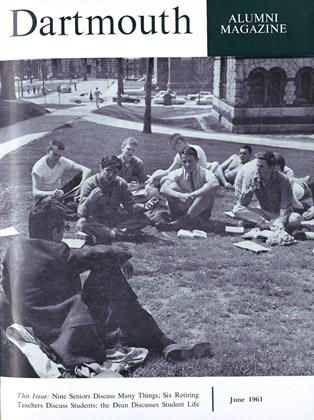Radio is far from dead. And this will continue to be true if Gerard Johnston '28 and Richard S. Jackson '39 have their way. These men have given the radio industry a transfusion of new ideas and created a network of stations that want top quality programs.
It all started in 1957 when Jerry Johnston set up his own advertising agency in New York City. One of his first ventures was an attempt to contract a number of radio stations to carry a series of football games. He was bothered, however, by the fact that present major networks would give him cities he didn't want and at the same time wouldn't give him cities he did want. So, as Johnston put it, he made up his own radio network, by buying time with stations affiliated with all four of the existing networks as well as independents.
Last winter Johnston went one step further, and using the football network as a basis, created a line-up of stations which carried the weekly Metropolitan Opera broadcasts. The twenty programs were carried by 112 AM and 60 FM stations and covered 95 per cent of the country.
Jackson entered this expanding picture when he implemented still another program which followed the opera broadcasts. The program was called "Special Report" and featured timely reports from Newsweek editors and correspondents. Each broadcast treated a segment of news in depth dealing with such subjects as international law in space, the first fifty days of the Kennedy administration, and the problems of Castro's Cuba.
Each station in the Johnston-Jackson network was selected on the basis of type and character of the station as well as its coverage pattern. The stations in turn have welcomed the quality of programming available through the special line-up.
Already Johnston and Jackson are planning a number of activities in the field of music and dramatic art that will be available for national sponsorship. They are exploring the possibility of broadcasts featuring the leading symphony orchestras of our big cities with top guest conductors; and also Gustave Haenschen, conductor of the long-time favorite "American Album of Familiar Music," in a program of American music, spiced with grass-roots humor by Herb Shriner.
Other projects being talked about include dramatic presentations with name actors and actresses in the works of Dickens and Shakespeare; a new daytime drama series well beyond the limits of soap opera, with leading players; a series with leaders in arts and letters; a daily business show; a sports-in-depth program, and a women's feature show.
Johnston and Jackson do not fancy themselves as program producers, but consider themselves open to discuss any program or show idea with clients or agencies. The two have brought together a vast background of experience.
Johnston worked for the General Motors Corp., in public relations, and then the J. M. Mathes and Kudner advertising agencies. Since World War IX, Jackson has worked for King Features Syndicate, WAVE-TV in Louisville, Ky., and the J. M. Mathes firm. At the present time he is also president of radio station WBEC in Pittsfield, Mass.
As for the future, the sky appears to be the limit. It is no trick, according to Jackson, to procure the finest talent and production, but it is more difficult to procure an agreeable network. This is the Johnston-Jackson specialty, and may be a big step forward on radio's road to recovery.
Jerry Johnston '28 (left) and Dick Jackson '39 in the radio studios at the Metropolitan Opera House, New York, during a broadcast.
 View Full Issue
View Full Issue
More From This Issue
-
 Feature
FeatureNine Seniors Speak Out for Individuality and the Intellectual
June 1961 -
 Feature
FeaturePacifism and Other Issues: A Survey of 1960 Attitudes
June 1961 By E. PETER STARZYK '60 -
 Feature
Feature"As Active As They Are Bright"
June 1961 By THADDEUS SEYMOUR -
 Feature
FeatureAn Impressive List of Honors
June 1961 -
 Feature
FeatureSix Professors Retiring in June Comment on Students of Today
June 1961 -
 Article
ArticleTHE FACULTY
June 1961 By HAROLD L. BOND '42
Article
-
 Article
ArticleMEDICAL SCHOOL GRADUATION
APRIL 1906 -
 Article
ArticleCHENEY '20 .RECEIVES COFFIN FELLOWSHIP A SECOND TIME
August, 1925 -
 Article
ArticleFace to Watch
NOVEMBER 1997 By Abigail Klingbeil '97 -
 Article
ArticleHome of Their Own
JANUARY 2000 By Jen Whitcome '00 -
 Article
ArticleTHERE'S METHOD Behind the Fall Madness
October 1950 By ROGER K. WOLBARST '43 -
 Article
Article25th REUNION GIFTS
October 1943 By SIDNEY C. HAYWARD '26

